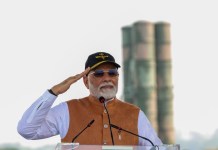Amidst rising border tensions between China and India, China says that the ‘Anti-China’ sentiments are surging in India and New Delhi must control it before it goes out of hand.
The US-China relations have been flaring up with Chinese experts holding ‘Indian opportunists’ responsible for attempting to “fish in troubled waters to pressure China”, which can “seriously damage strategic China-India mutual trust”.
As per the reports, India and China have been trying to bilaterally de-escalate border tensions that started when troops of both the countries pitched tents in the Galwan Valley in Aksai Chin along the Line of Actual Control (LAC).
According to Long Xingchun, a senior research fellow of the Academy of Regional and Global Governance, Beijing, some radical media outlets and organizations in India are relentlessly promoting anti-China sentiments.
He further states that while the Indian military and government’s response has been calm and restrained, it should take note of “extreme anti-China sentiment that is rapidly rising”. “It must be made clear that they are not responsible for India’s politics and economy. Their actions are in pursuit of their own interests and to attract attention,” he added.
“The Indian government should ensure the border issue is not hijacked by these blind anti-China groups, so that bilateral relations are not pushed to a dangerous position and to prevent a repeat of the 2017 Doklam standoff,” stated Xingchun.
As reported earlier by EurAsian Times, the “Remove China Apps” was pulled down by Google Play Store, two weeks after its launch. Remove China Apps, which claimed to be “educational,” had briefly been the most popular in India’s store, being downloaded more than 1 million times within 10 days of launch.
The application enabled users to detect Chinese apps on their phones and delete them if desired, according to its developer. The hashtag #BoycottChineseProducts had been trending on Twitter, with many Indians pledging to stop using Chinese products.
“The developers have obviously forgotten that economic cooperation always benefits both sides,” observed Xingchun. He further added that the Chinese apps that are targetted by such “anti-China individuals” have provided plentiful employment for Indian workers, driving the overall development of the Indian technology industry.
He acknowledges that there’s only a small percentage of the Indian population, which doesn’t represent the “rational but silent majority”.
Another alternative for the Chinese app Tik Tok which came up on the Google Play store, called ‘Mitron’. It was also removed from the Google Play store over security concerns. “TikTok is a legal source of income for many Indians. If anti-China groups want Indians to delete all Chinese programs on their phones, they may have few apps remaining,” stated Xingchun.
Xingchun has lashed out at the Indian government’s move to deter Chinese firms, which recovered from the crisis earlier than other countries, to acquire vulnerable Indian companies. “This not only damages India’s economic recovery but also hinders India’s opening-up progress.
If India allows narrow-minded nationalism to spread to the field of science and technology, it will definitely hurt its own interests in turn,” he wrote.
He concluded by saying that India should instead utilize economic cooperation to buffer its tensions with China, particularly at a time when economic recovery needs to be accelerated. “India needs to release positive signals to promote the development of economic cooperation,” he wrote.




